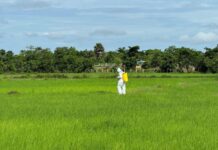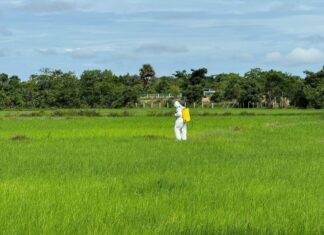A new generation of environmentally conscious Cambodians are turning to vegetarianism out of concern for climate change, but say finding meat-free food in the country remains a challenge.
Students and young workers around Phnom Penh who have turned to eating a plant-based diet told reporters this month that they were concerned by the emissions, environmental costs and cruelty of animal farming and hoped to see vegetarianism become a wider trend in the country.
Thai Sokcheng, 23, an NGO program manager, said she became vegetarian about two years ago out of her love for animals and the environment.
“I wanted to be more sustainable,” Sokcheng said. “I just came to realize how important this diet [is in connection] to helping the environment [after] reading articles and watching documentaries.”
She also had four cats at home, and it made her not want to eat other animals, she said.
“I kind of have empathy towards other animals as well with the love I have for my cutie cats,” she said in a message.
Sokcheng said it was still hard to find vegetarian restaurants around Phnom Penh, but it seemed the situation was improving in recent years.
Yong Heng, a 26-year-old international relations student at Pannasastra University, said he was concerned about the environmental impact of meat farming.
“I wish our country would be less polluting to the environment,” Heng said.
If half of the country’s 16 million people were to become vegetarian, there would be fewer problems with diseases and chemicals from imported meat, no African Swine Fever, and “our country would be covered by plants and trees,” he said.
But for now, “in Cambodia, not so many people understand about being vegetarian so it is difficult to find a vegetarian restaurant,” he said. “Maybe in 10 more years, there might be a lot of vegetarian restaurants in Phnom Penh.”
Heng added that he hoped vegetarian options would be added to the menus of university cafeterias, and that the Education Ministry would make it a requirement.
Keung Chankirirom, 22, who studies chemical engineering and food technology at the Institute of Technology of Cambodia, said that for him being vegetarian wasn’t only about the environment.
“I like to eat vegetarian food because it is delicious and makes me healthy,” Chankirirom said.
He was also concerned about runoff from animal feces polluting the environment, he said, and wanted to see more plants grown to absorb greenhouse gases.
Sok Luk, co-founder of Scholar Library, a community library in Phnom Penh, said dining options for vegetarians in the city were slowly expanding.
“In the past it was difficult to find a vegetarian [meal] but now it is a little better to find a vegetarian place in Phnom Penh,” he said.
He ate mostly vegetarian at home, but found that eating vegetarian at restaurants could be a little expensive, he said.
Vat Phearun, the founder of Evergreen Vegetarian House in Daun Penh district, who goes by Steven, said when he opened his restaurant 10 years ago, there were almost no vegetarian places to eat out.
“So my family decided to open a vegetarian restaurant in Phnom Penh,” he said.
His menu contains the quote, “Animals are my friends, and I do not eat my friends.”
Steven said his whole family eats vegetarian for religious reasons.
According to a study in the journal Nature published in October 2018, producing beef emits more than 100 times as much greenhouse gases as growing legumes.
The study, which was cited in a CNN report last year, says diets high in red meat, alongside a growing population, could increase the pressure that the food system puts on the environment by up to 90 percent by 2050.
That level of pressure would exceed “key planetary boundaries that define a safe operating space for humanity beyond which Earth’s vital ecosystems could become unstable,” study author Marco Springmann told CNN.
Australian federal research institute CSIRO says livestock farming contributes up to 18 percent of total greenhouse gas emissions worldwide, and farming makes up about 70 percent of all freshwater use by weight, according to the U.N. Food and Agriculture Organization, the Australian Broadcasting Corporation reported.












